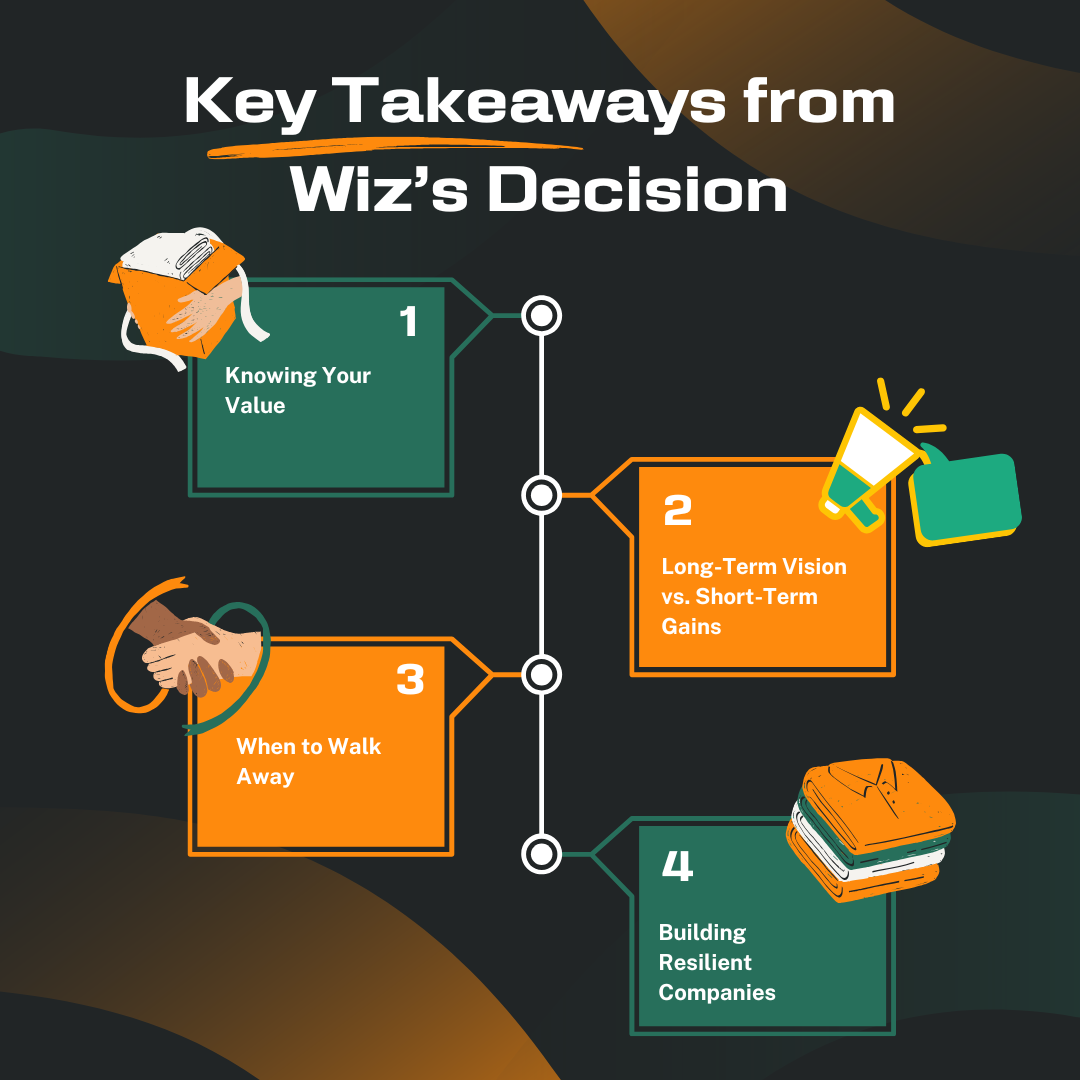Wiz CEO's Bold Choice: Rejecting a $23 Billion Deal for Vision

In a rather unexpected turn of events, the CEO of the well-known cybersecurity company Wiz has refused an “insane” $23 billion buyout offer not too long ago. Perhaps what drove the entire tech industry’s attention to this decision is what would drive the CEO to make such a decision even when the offer is so attractive. Wiz, which was founded only three years ago in 2020, has emerged as a leading firm in cloud security, a relevant market that often has valuations even exceeding billions of dollars. Besides illustrating the rapid growth of the WiZ Company, the 23 billion dollar bid offers a picture of the modern-era startup environment’s opportunities and challenges.
This blog examines the reasons behind Wiz Czar's decision to decline the acquisition and the effects of this decision on business owners. Understanding this controversial rhetoric – how they can refuse to sell their business looking at the $23 billion deal – highlights some factors on startup valuation, type of strategy employed, and the nature of the industry creating endless acquisition opportunities.
Background: Wiz, Its Growth, and Market Position
Company Overview
Founded in 2020, Wiz is a cybersecurity firm that focuses on cloud security, specializing in identifying vulnerabilities within cloud infrastructures. The company operates in a critical space, as organizations increasingly move data and operations to cloud environments, heightening security risks. Wiz's technology uses deep analysis and automation to detect and address these risks, setting it apart in the highly competitive cloud security market.
Growth Trajectory
Wiz has seen meteoric growth, rapidly gaining clients and securing substantial funding from top-tier investors. In less than four years, the company reached a valuation of $10 billion, becoming one of the fastest-growing cybersecurity firms in history. This accelerated rise has positioned Wiz as a leader in cloud security, capturing the attention of major players in the industry.
Why It’s a Big Deal
The $23 billion acquisition offer underscores the strategic value of Wiz’s technology and expertise. In the cybersecurity landscape, such an offer is significant, suggesting Wiz’s potential to shape the future of cloud security.
The CEO’s Perspective on Turning Down the Offer
When offered a $23 billion buyout which could have come at the expense of its values, Wiz CEO Assaf Rappaport maintained that such short-termism was destructive to the business. Such decisions for Rappaport emphasized control over acquisition which in this case would outsource Wiz's mission rather than nurturing it pushing the company to achieve its values. This dissonance of desires between an entrepreneurial founding team and the investors is what makes the acquisition a last option in the eyes of the CEO of the cyber security startup.
Visting common culture-based issues Rappaport also accepted the relevancy of control in this case to be quite significant. Remember that for Wiz a large degree of autonomy also means a different culture altogether which he claims would come under pressure in case of acquisition. An important lesson of this choice for entrepreneurs is how they should prioritize their controls rather than chasing a dollar figure. Wiz’s strategy manages to illustrate how for new ventures the option of making a lucrative offer is always weighed up with potentially diluting one’s original goals.
Lessons for Entrepreneurs: Key Takeaways from Wiz’s Decision

The Wiz CEO’s choice to reject a $23 billion deal underscores valuable lessons for entrepreneurs.
Knowing Your Value: Understanding your company’s true worth, beyond market estimates, is crucial for sustainable growth. When evaluating offers, it’s essential to focus not just on revenue but on the potential impact and future trajectory of the business.
Long-Term Vision vs. Short-Term Gains: The Wiz CEO’s decision demonstrates the importance of a forward-thinking approach, prioritizing the company’s long-term potential over immediate profits. This perspective encourages startups to aim for enduring growth and innovation rather than settling for lucrative but limiting deals.
When to Walk Away: Declining a high-stake offer like the “Wiz CEO $23 billion deal” requires discipline, ensuring that all decisions align with core values.
Building Resilient Companies: Entrepreneurs can learn from Wiz’s resilience, aiming to strengthen company foundations, thus positioning themselves to reach—or exceed—future valuations.
Potential Risks and Rewards of This Decision
Turning down a reported $23 billion offer, as the Wiz CEO did, poses considerable risks, as well as rewards, for the cybersecurity firm. There is one such risk that follows right away, which is increasing rivalry since Wiz’s choice to stay independent implies that the company has to grow organically but fends off aggressive competitors at the same time. Without those parent companies, Wiz has financial and market risks, which might restrict the scale or the profitability—something that would be of consideration for an entrepreneur who is in such a position.
However, there are lots of potential benefits. This means that Wiz maintains its independence and does not have to sacrifice its vision and profits from the future so that the company can increase its growth potential and its value in the long term. Just like companies such as Facebook and Snapchat who said No to merger offers. Facebook made an appropriate decision and was met with great achievements whereas on the contrary, Snapchat has seen its expansion relatively inconsistent. This decision by Wiz could motivate an important lesson for entrepreneurs on how to make their offers, while still considering the big picture.
A Bold Move with Big Implications
The Wiz CEO's refusal of a mind-boggling $23-billion deal is the kind of gamble that separates great leaders from mediocracy, proffers Sacheti. In turning down a huge acquisition, Wiz has proved it's serious about building for the long-term and innovating within the industry; more concerned with their mission and values than quick financial wins. That message sheds a bit of light on the level of confidence in their business plan and it once again cements my belief that valuation needs to meet vision.
This also breaks the norm for exits and acquisitions in tech, where it could shift how other founders might think about more than just large monetary gains through their growth paths. There are crucial learnings for entrepreneurs in risk management, vision, and the power of leadership from these stories which paint a picture of what can loop an enterprise to its uncertain past or future.
Discover how to elevate your digital experience! Visit digitalexperience.live for insights, tips, and innovative strategies that transform your business. Join our community of forward-thinkers and start your journey today—let’s create exceptional experiences together!
FAQs
1. Why did the CEO of Wiz turn down a $23 billion acquisition offer?
Wiz CEO Assaf Rappaport prioritized long-term vision over immediate gains, valuing the company’s mission, culture, and autonomy over potential external ownership.
2. What does Wiz's rejection of the acquisition offer mean for the tech industry?
Wiz’s decision challenges traditional exit narratives, encouraging startups to prioritize core values and long-term growth over financial offers, emphasizing the importance of control.
3. What lessons can entrepreneurs learn from Wiz's decision?
Entrepreneurs can learn to understand their true value, prioritize long-term vision, and recognize when to decline lucrative offers, emphasizing innovation over immediate profits.
4. How has Wiz achieved such rapid growth since its founding in 2020?
Wiz’s growth stems from its focus on cloud security, innovative technology, and strong investor support, positioning it as a leader in a booming market with a $10 billion valuation in under four years.
5. What are the potential risks and rewards of declining a high-stakes acquisition?
Declining a $23 billion offer carries risks like increased competition but allows for maintaining control, pursuing the company’s vision, and enhancing long-term valuation, essential for entrepreneurs to consider.



